B2B ecommerce is among the fastest-growing markets, projected to reach $36,107.63 billion by 2031. The pie is big and everybody wants a slice.
But who’ll eat to their heart’s content?
Those who picked the right B2B platform to begin with. With 75% of buyers willing to switch to a supplier who offered a better online buying experience, according to Sana, you can’t afford to make the wrong choice.
This is not to say there’s one, ultimate platform—you have unique needs, and this article reflects this.
Automate your B2B customer service with Lyro AI Agent
What is a B2B ecommerce platform?
A B2B ecommerce platform enables businesses to sell goods/services to other companies online, streamlining customer relationships. It boosts productivity and scalability with features like bulk ordering, custom pricing, and CRM/ERP integration, while using AI to optimize customer journeys and reduce costs.
Why businesses need a B2B ecommerce platform
Digital sales channels are becoming the go-to solution for B2B companies looking to engage in a more streamlined way with buyers. According to Gartner, 80% of business-to-business sales will take place online by the end of 2025. In fact, 64% of consumers prefer an all-online purchasing experience, especially if they’re already familiar with the product or service.
This is a win-win scenario for both Bs in the B2B acronym—convenience for the buyer, higher client retention rates, and quicker sales cycles for the sellers.
And what about product discovery? With thousands, or sometimes even millions, of SKUs in B2B catalogs, you need to provide sophisticated search, filtering options, or AI agents and AI chatbots.
Then there are abandoned carts, lost sales, and overall subpar customer experience, which you can remedy with an AI-driven B2B ecommerce platform.
Key benefits of using a B2B ecommerce platform
Implementing B2B ecommerce software changes how companies sell. It helps them run their operations better and interact with their clients in a more efficient and scalable way. It’s more than just a digital storefront, and here’s why it’s a must:
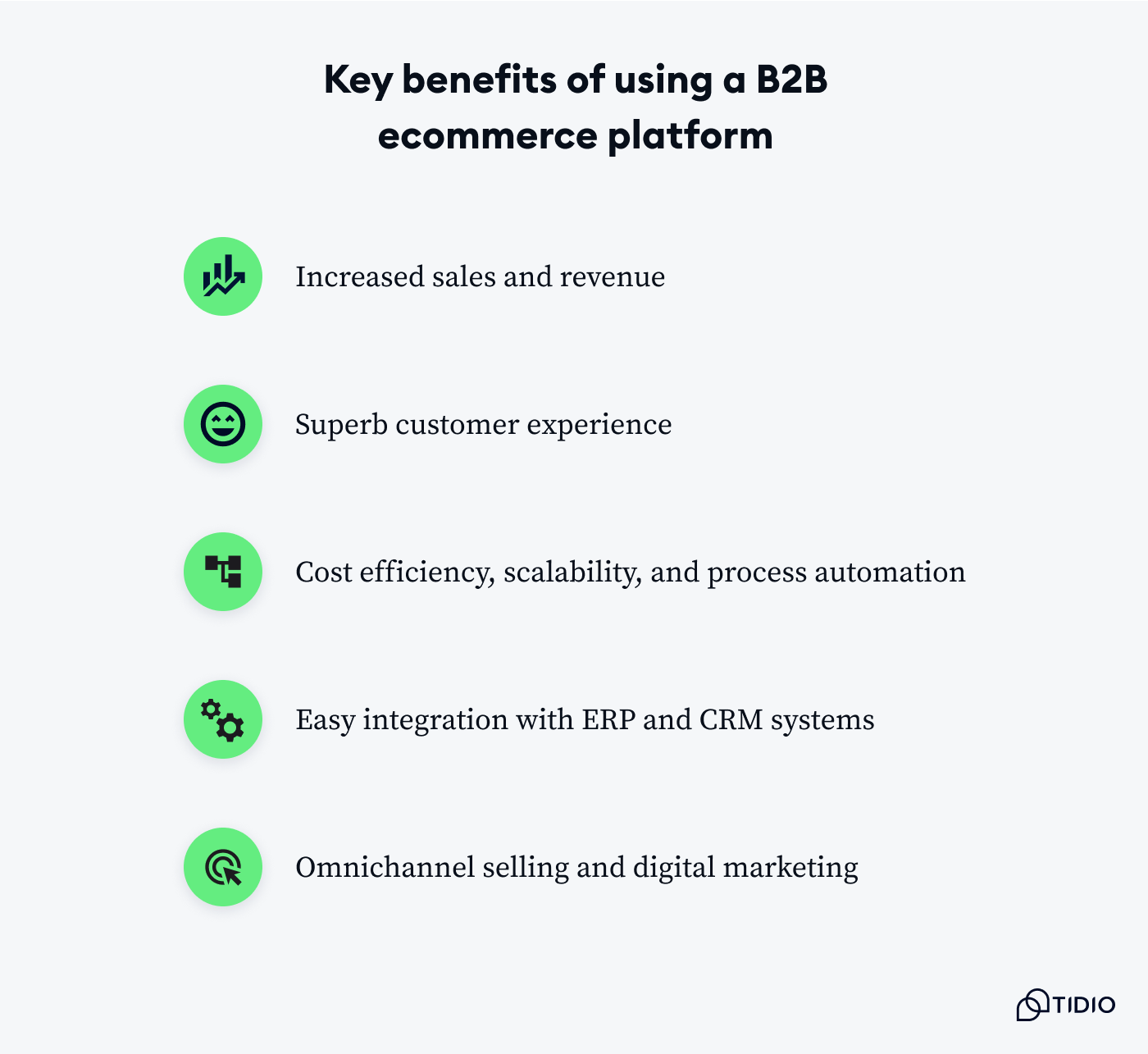
1. Increased sales and revenue
Automation, AI-driven product suggestions, and personalized pricing help companies turn leads into clients. Not to mention shorter sales cycles, and opportunities to upsell, cross-sell, and more.
For example, Tidio’s AI agent Lyro can handle shopping cart recovery, helping our many clients turn abandoned carts into actual conversions.
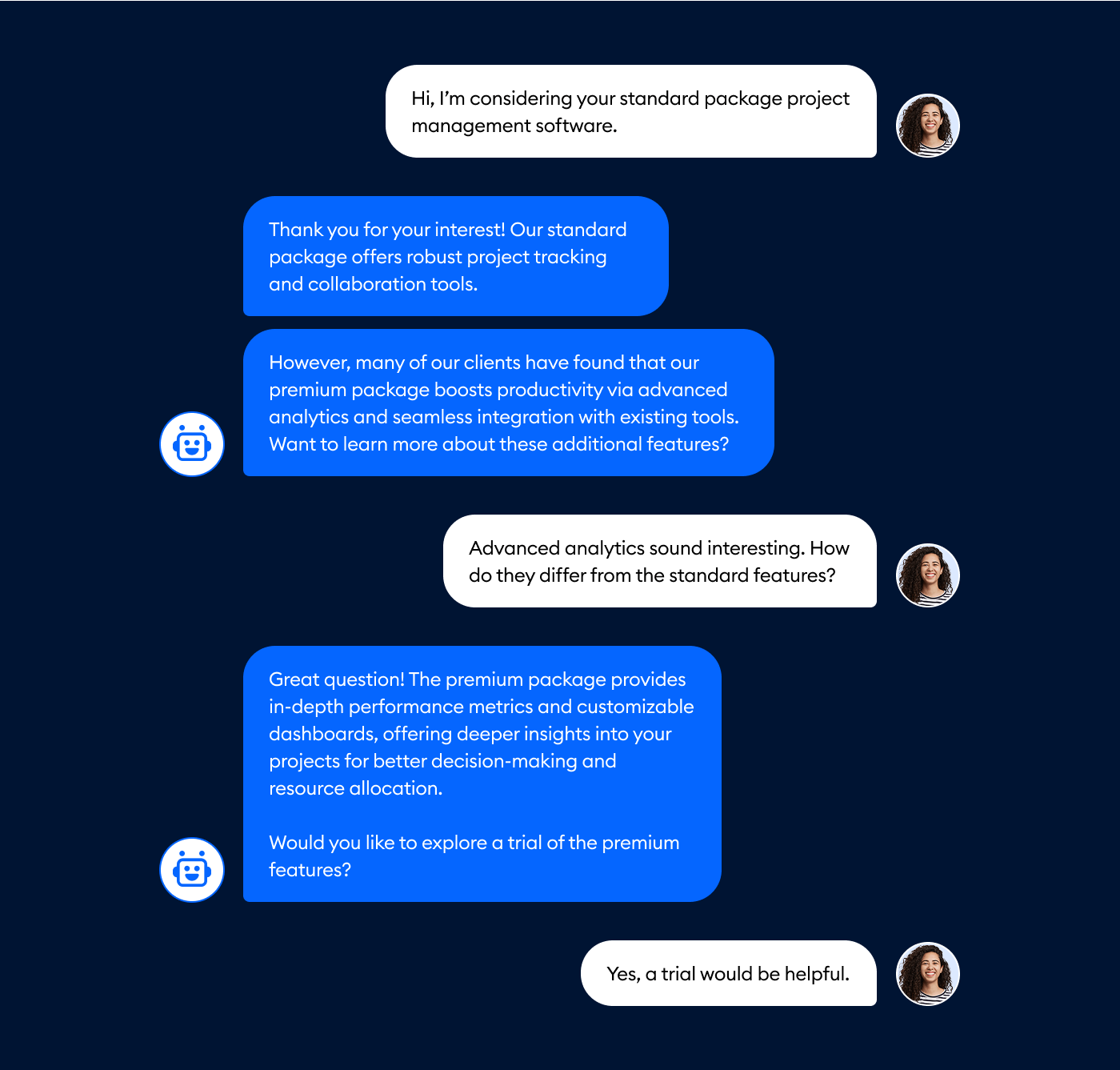
2. Superb customer experience
B2B buyers want an easy way to place orders, track shipments, and look through digital catalogs at their own pace. They want self-service. Yet, according to Sana, 85% of them experience frustrations when buying online. Remove friction, and new B2B clients will come in droves.
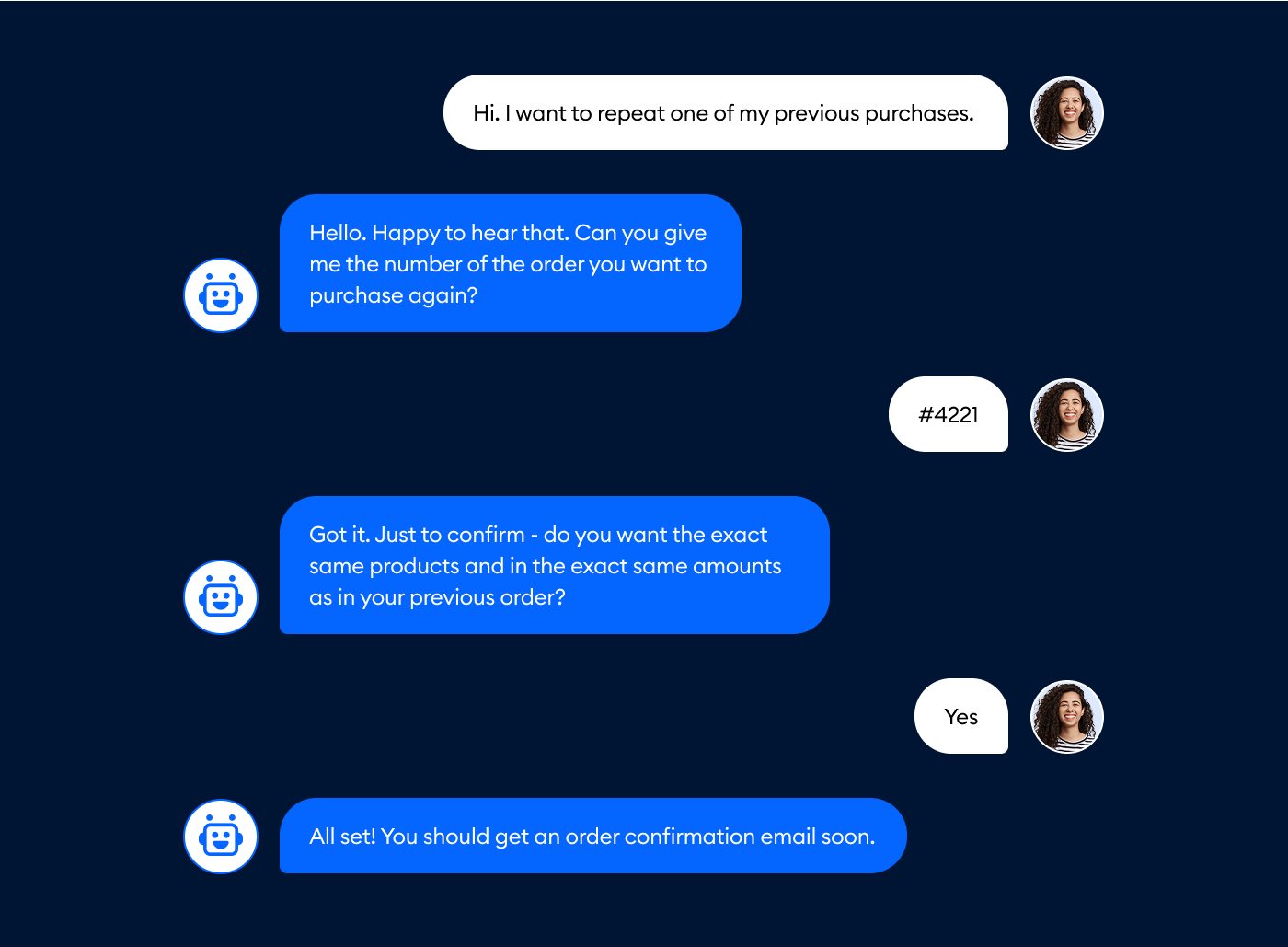
3. Cost efficiency and process automation
AI-driven B2B ecommerce platforms reduce operational costs and human error, while raising CSAT scores by 20%. Not to mention scalability. AI agents automate tasks like order handling, answering FAQs, billing, and supply chain management. This frees sales teams of tedious administrative tasks and lets them do what they do best—sell.
B2B ecommerce example: Lyro can help with questions related to changing the shipping address.
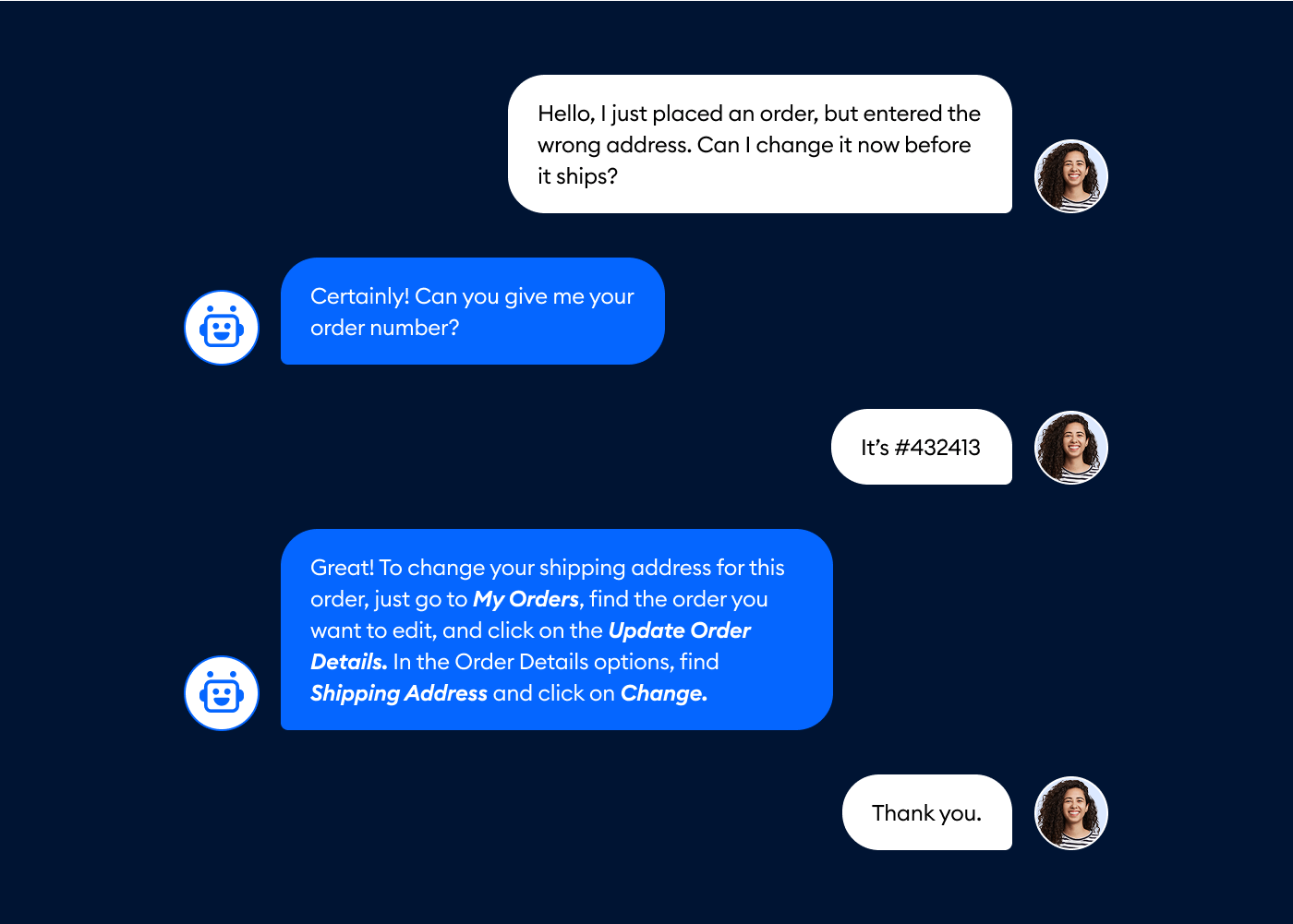
Read more: Use our ROI calculator to find out your potential cost reductions with Tidio.
5. Easy Integration with ERP and CRM Systems
Real-time synchronization of inventory, pricing, and customer data is achieved through seamless integration with Enterprise Resource Planning (ERP) systems and Customer Relationship Management (CRM) platforms. For manufacturers, this often means integration with manufacturing ERPs that handle production planning, inventory, and order fulfillment. This simplifies data silos, increases operational effectiveness, and provides a combined perspective of consumer contacts and sales performance.
6. Omnichannel selling and digital marketing capabilities
B2B ecommerce platforms allow businesses to engage customers across multiple channels, including websites, mobile apps, marketplaces, and social media. Integrated digital marketing tools, such as AI-powered email automation and targeted advertising, help generate leads and drive conversions across different touchpoints.
For example, Tidio offers a single dashboard that ensures all inquiries, whether from chat, email ticketing channels, or social media, are prioritized and resolved seamlessly, so nothing slips through the cracks.
It can also be trained to gather important leads:
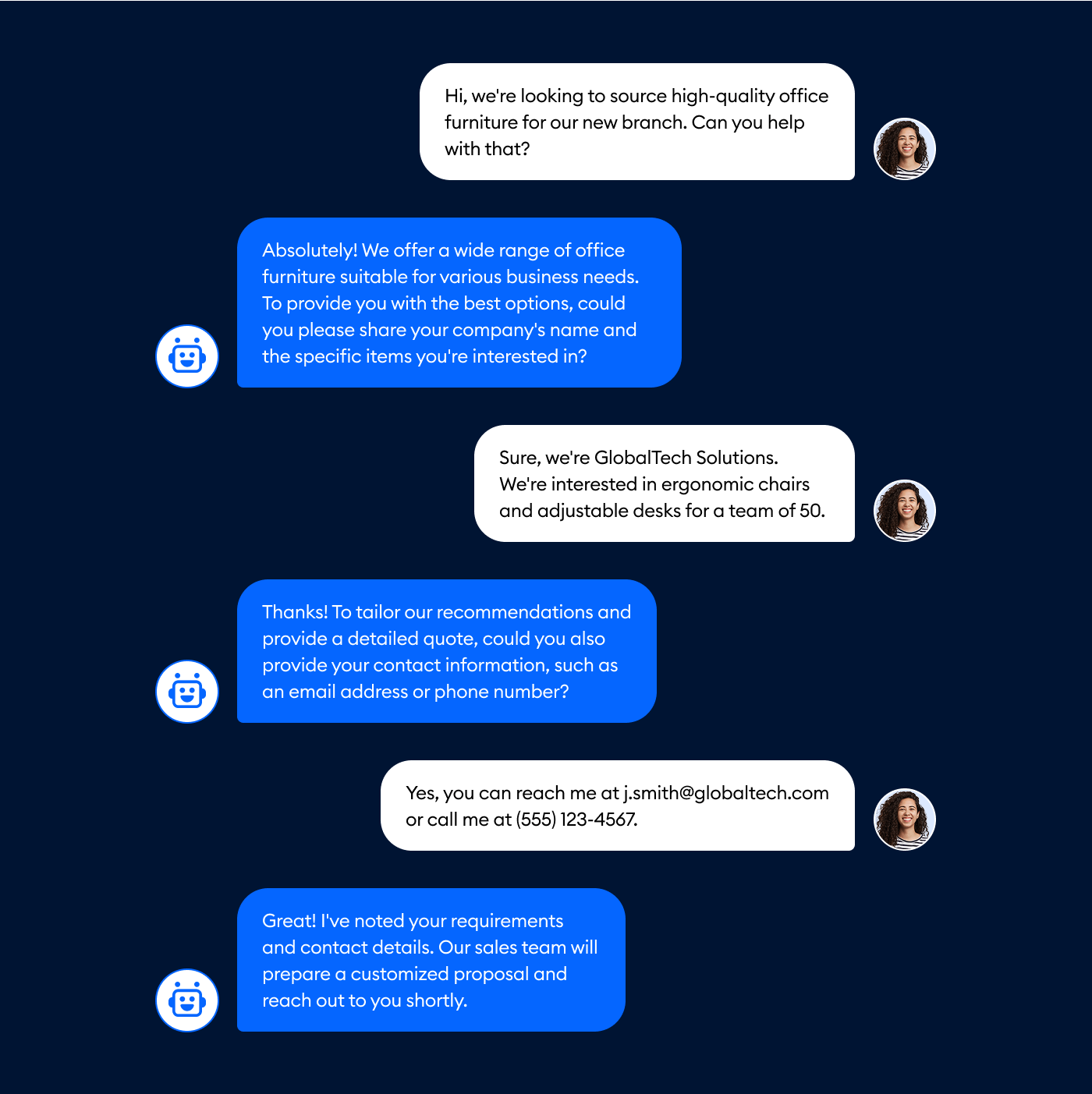
Improve sales and cut B2B customer service costs with Tidio
Top B2B ecommerce platforms
There are numerous B2B ecommerce platforms available on the market. It can be quite overwhelming for businesses to choose the optimal one for their unique sets of needs. That’s why we did the research for you.
Here are descriptions, key features, and pricing comparisons of the top five B2B platforms:
| Tool | Rating | Free plan | Best for |
| Tidio | 4.7/5 ⭐️ | ✅ | Lyro AI agent and chatbots for customer service automation |
| Shopify Plus | 4.8/5 ⭐️ | Free trial | Enterprise-level B2B ecommerce |
| HubSpot Commerce Hub | 4.4/5 ⭐️ | ✅ | For quick and easy checkout experiences |
| BigCommerce B2B Edition | 4.4/5 ⭐️ | Free trial | Creating scalable, personalized, and efficient online storefronts |
| Adobe Commerce (Magento) | 4.3/5 ⭐️ | ❌ | Building scalable, customizable, and feature-rich eCommerce websites |
| OroCommerce | 4.7/5 ⭐️ | ✅ | Creating customizable B2B eCommerce platforms |
1. Tidio
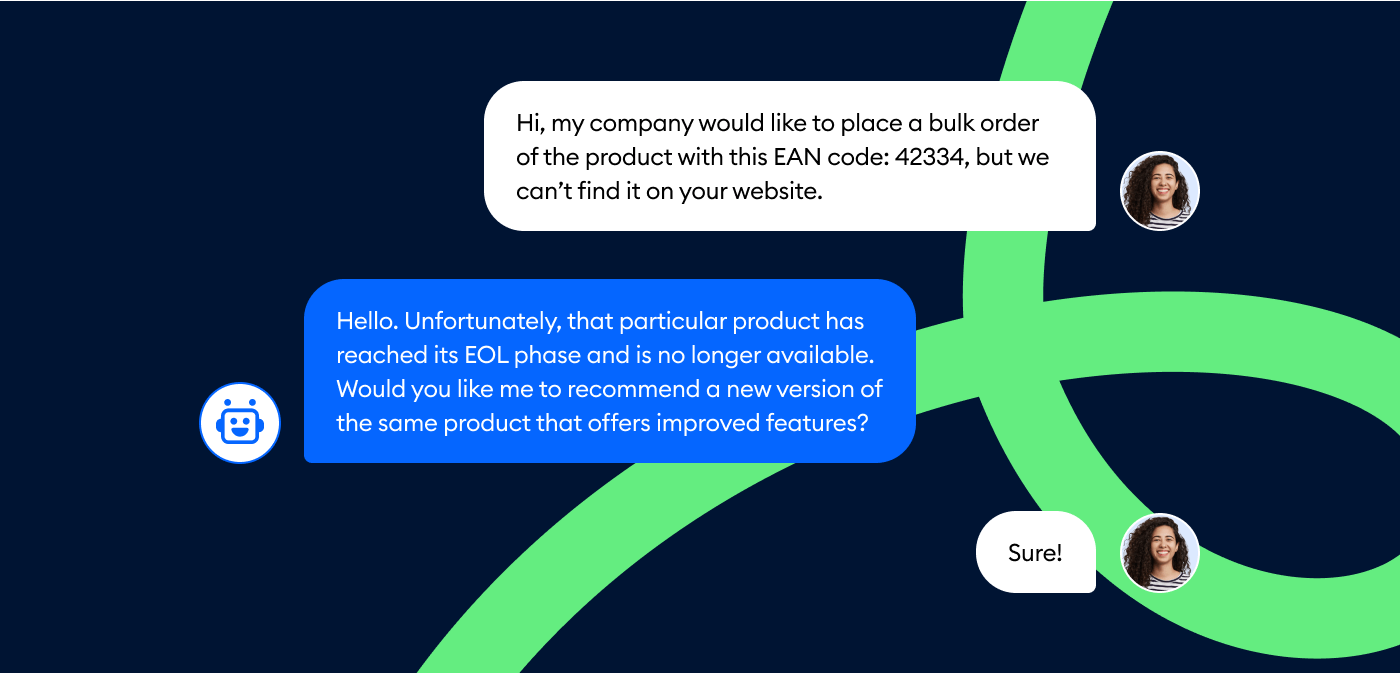
Rating: 4.7/5 ⭐️ (1,640+ reviews)
Tidio combines live chat, AI-powered chatbots, and helpdesk tools into one easy-to-use platform. Its chatbot automation is especially valuable for ecommerce stores handling frequent B2B inquiries such as order tracking, pricing requests, and lead qualification. Its seamless integration with ecommerce platforms like Shopify, WooCommerce, and BigCommerce makes it a powerful support tool.
Tidio’s conversational AI agent Lyro integrates with existing platforms, manages demand spikes, and resolves up to 64% of repetitive inquiries. This helps your human agents focus on complex cases that require human empathy and critical thinking.
Main features:
- NLP, AI agent and AI chatbots
- AI for email
- Shared inbox
- Automated ticket routing
- Product recommendations
Pricing:
- 7-day free trial available
- Free version available
- Starter ($24.17/mo)
- Growth (starts at $49.17/mo)
- Plus (starts at $749/mo)
- Premium (starts at $2999/mo)
2. Shopify Plus
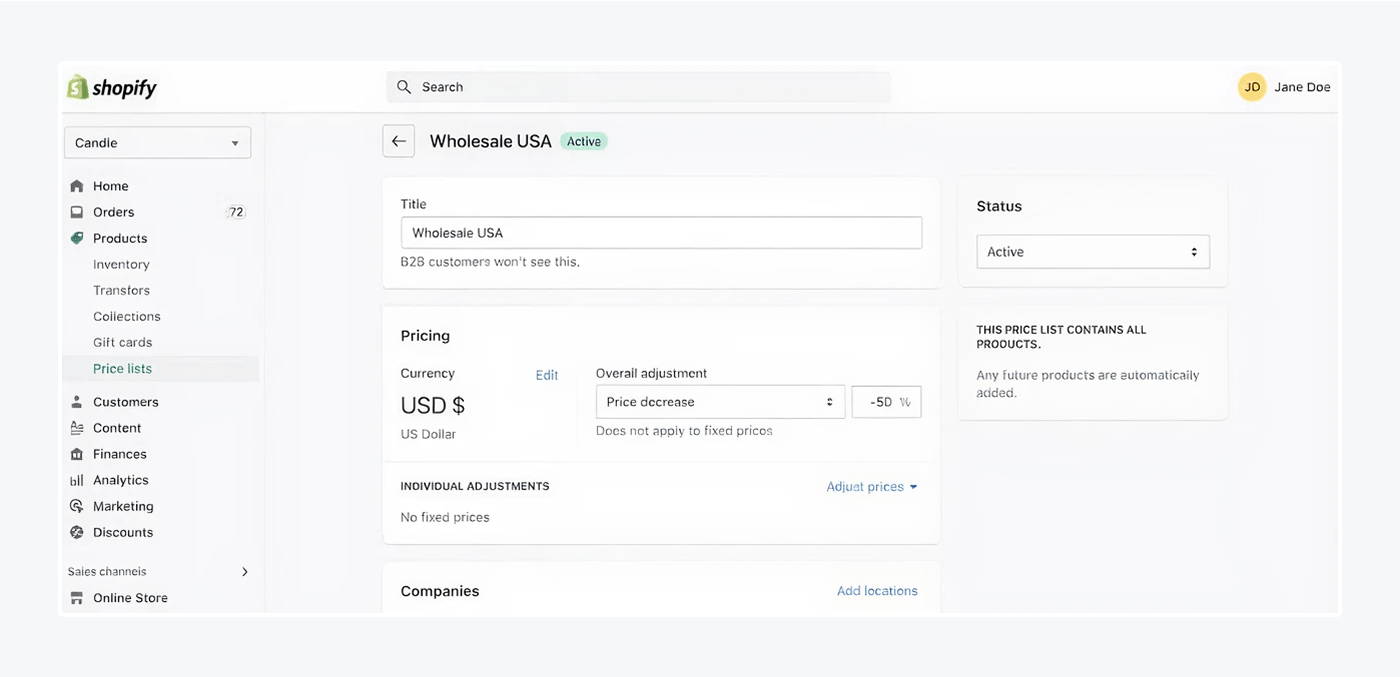
Rating: 4.8/5 ⭐️ (100+ reviews)
Mainly used by high-growth B2B brands and wholesalers seeking scalability and custom storefronts, Shopify Plus brings B2B ecommerce features into its powerful ecosystem. It supports bulk pricing, customer-specific catalogs, and flexible checkout options. The tool is designed for businesses that sell both B2C and B2B and want to manage them under one platform.
Main Features:
- Custom storefronts
- B2B pricing, discounts, and catalogs
- Advanced checkout customization
- Automated workflows via Shopify Flow
- Integration with ERPs and CRMs
- Custom pricing (starting at $2,500/mo)
3. HubSpot Commerce Hub
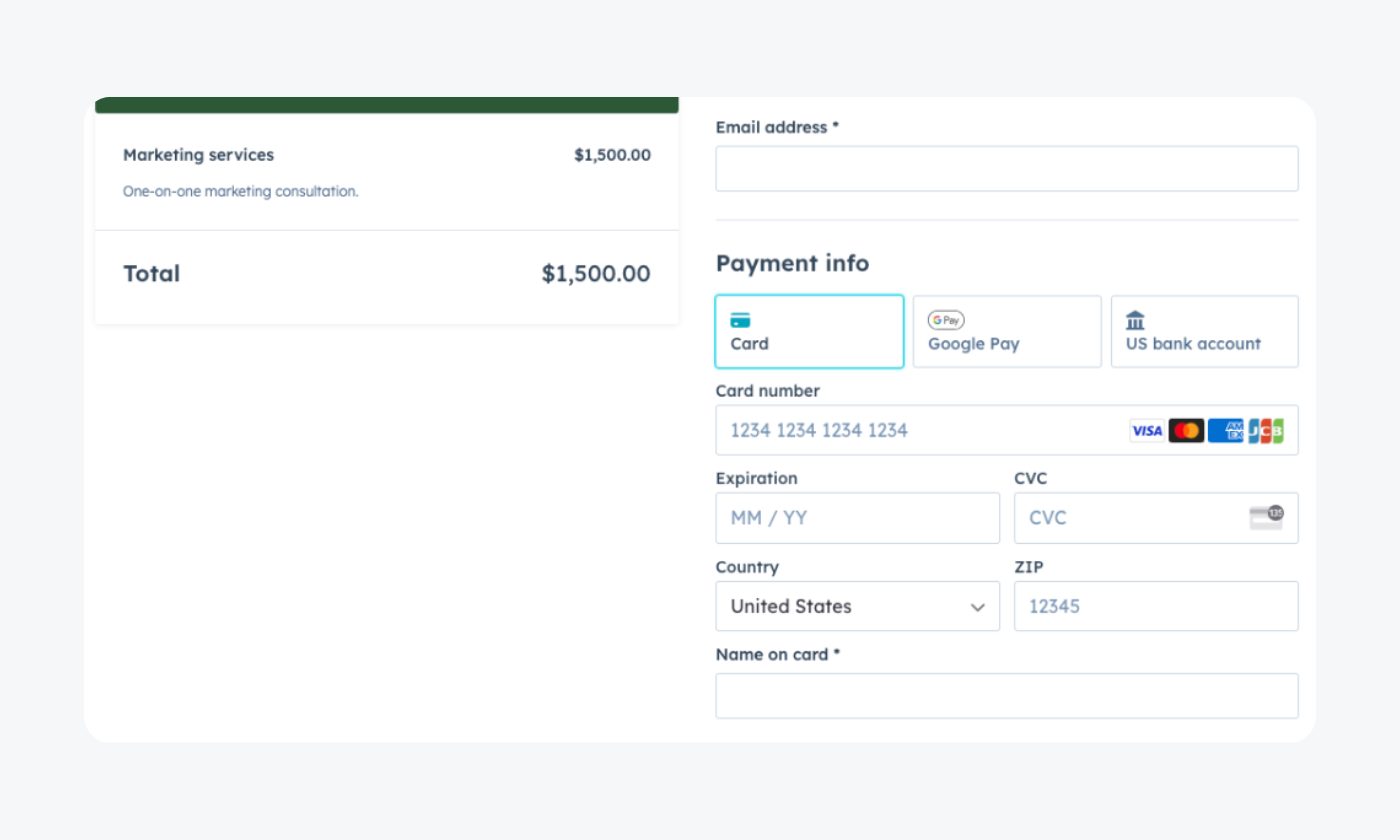
Rating: 4.4/5 ⭐️ (15 reviews)
HubSpot’s Commerce Hub lets you set up super straightforward payment checkout experiences. The platform supports 130+ currencies, while the option to set up invoices, quotes, and payment links adds an extra layer of convenience—customers can pay you with their preferred payment method. Plus, HubSpot also integrates natively with Stripe and QuickBooks, which makes payment processing and management that much faster.
Main Features:
- Built-in CRM
- Subscription management with recurring payments
- Custom billing automation features
- Revenue reporting
- Dedicated B2B checkout portals
- Free version available
- Extra features are unlocked after subscribing to HubSpot’s other products
4. BigCommerce B2B Edition
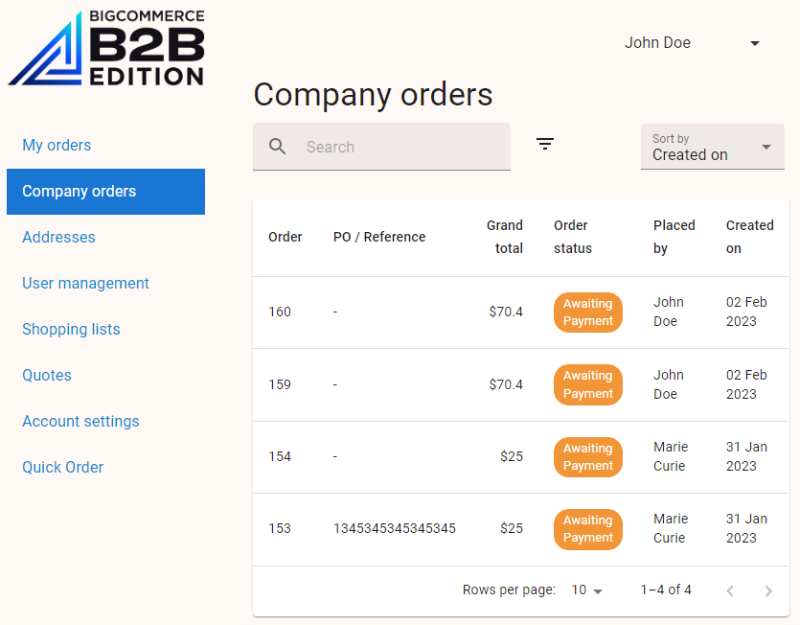
Rating: 4.4/5 ⭐️ (300+ reviews)
Aimed at mid-to-enterprise-level B2B companies with complex pricing and catalog needs, BigCommerce B2B Edition is tailored for wholesale businesses, manufacturers, and distributors. It offers customer group pricing, quote management, and API-first architecture, making it easier to integrate with backend systems. As a leading open SaaS solution, BigCommerce provides merchants enterprise-grade functionality, customization, and performance with simplicity and ease of use.
Main Features:
- Customer-specific pricing
- Quick reorders and bulk pricing
- Request for Quote (RFQ) workflows
- Buyer portals with access control
- PunchOut2Go integration for procurement systems
- Free trial available
- Starting at $29/mo
- B2B Edition pricing available via quote
5. Adobe Commerce (Magento)
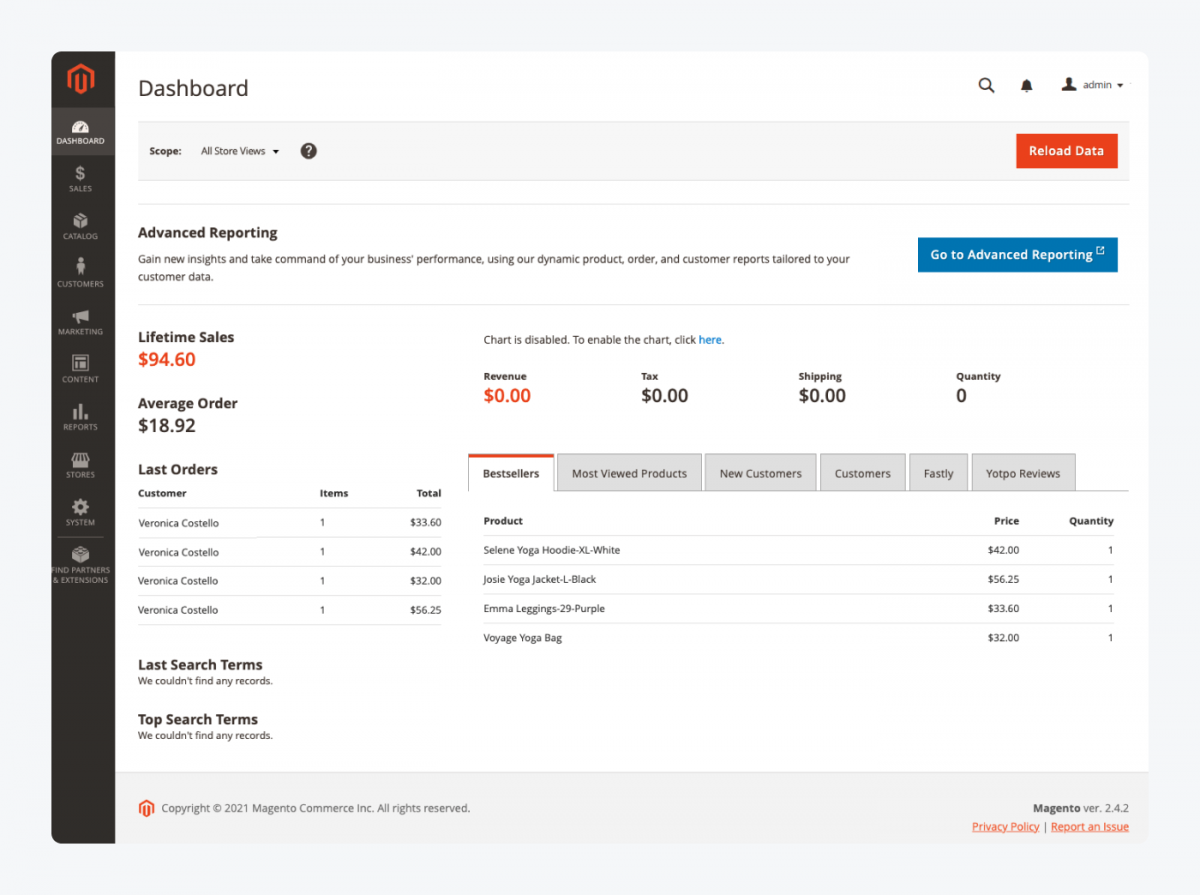
Rating: 4.3/5 ⭐️ (650+ reviews)
Mostly deployed by large enterprises needing deep customization and global scalability, Adobe Commerce (formerly Magento) is known for its extensive customization capabilities and strong B2B toolset. It includes features like custom catalogs, negotiated pricing, and purchase order approvals.
Main Features:
- Negotiated pricing and custom catalogs
- Purchase order and approval workflows
- Multi-brand/multi-store management
- Integration with Adobe Experience Manager
- Extensive API support
- Custom pricing based on scale and support level
6. OroCommerce
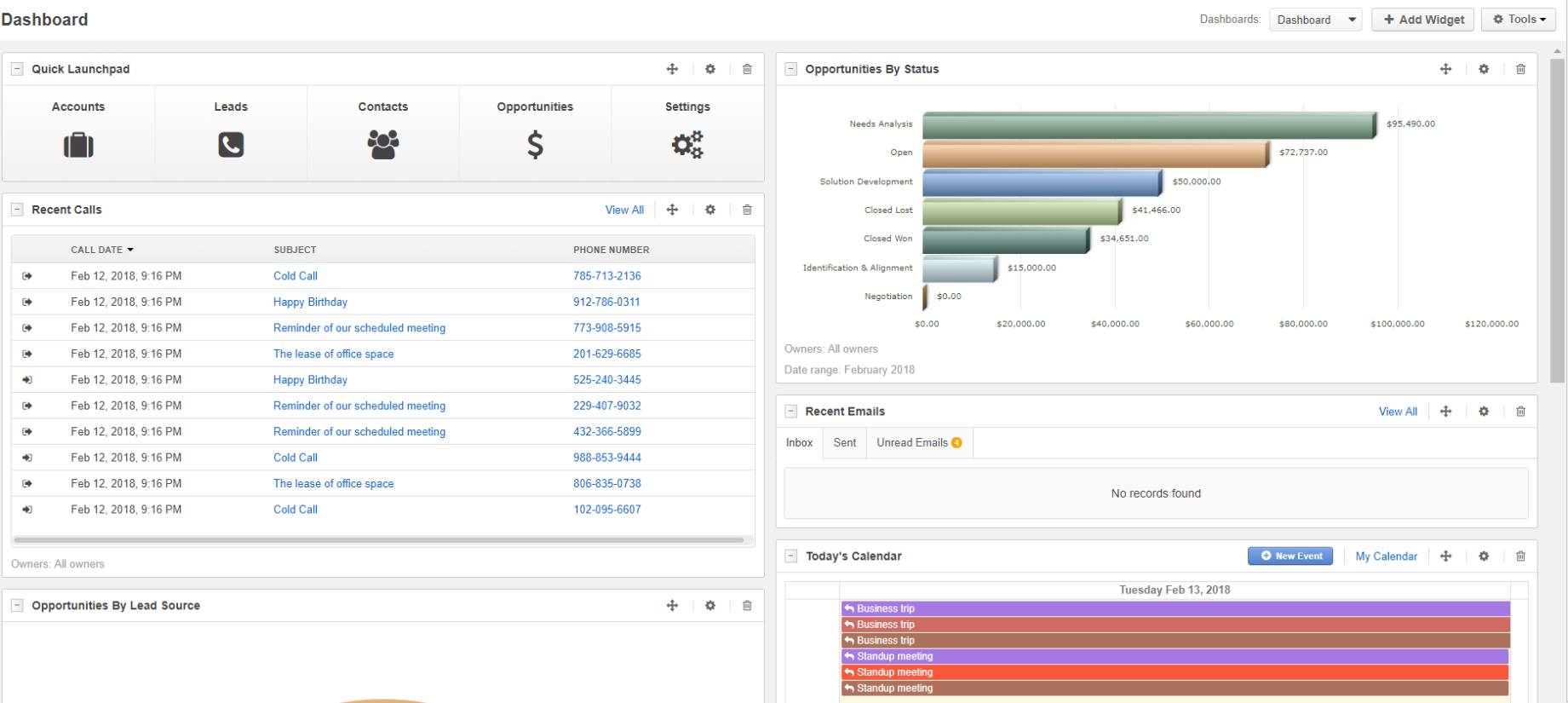
Rating: 4.7/5 ⭐️ (7+ reviews)
Aimed at manufacturers, distributors, and wholesalers with complex B2B operations, OroCommerce was built from the ground up specifically for B2B ecommerce. It supports advanced workflows, role-based access control, and multi-organization setups. It also integrates with OroCRM and OroPlatform for full digital commerce management.
Main Features:
- Role-based access and approval workflows
- Tiered and negotiated pricing
- Quote and order management
- CRM integration (OroCRM)
- Multi-site and multi-organization support
- Community Edition: Free and open-source
- Custom quote for larger implementations
B2B ecommerce success stories
Tidio, a provider of customer service automation tools, has significantly enhanced sales and customer service operations for various ecommerce businesses.
Here are three brief case studies illustrating these improvements.
Ad Hoc Atelier improved sales and slashed response times from 3h to 1 min
Ad Hoc Atelier was dealing with an 83% cart abandonment rate (industry average: 70%). The cause? Lengthy response times and dated communication channels, like phone calls and email.
To solve this, Ad Hoc Atelier added a live chat feature to their website. This gave users individualized, real-time help, like from an in-store assistant.
The results were impressive. Ad Hoc Atelier:
- Boosted its conversion rate from 0.35% to 0.9%
- Reduced cart abandonment rate by 10%
- Slashed average response time from 3 hours to just 1 minute
Having the chat really decreased our abandoned carts, and that is huge. It relates to lifetime value. If a consumer buys the product and enjoys the experience, they are more likely to do a second purchase. And nowadays, the competition for ecommerce is very tough, so it’s difficult to create a unique experience and be remembered by the customer.

Through quick, personalized communication enabled by Tidio, they significantly improved customer satisfaction, maintained high-quality conversations, and maximized sales opportunities.
This strategy helped Ad Hoc Atelier enhance customer engagement and capture more sales from website traffic, resulting in a notable increase in conversion rates and overall sales performance.
Since changing to Tidio and implementing the cart abandonment chatbot, we were able to increase the number of conversions. From the 537 conversations the bot managed, it assisted in 1.6k EUR total sales in 2023 alone. By offering prompt and helpful assistance through Tidio's live chat and chat flows features, we have built trust with our customers.

Read more: Check out the entire Ad Hoc Atelier case study here.
Eye-oo’s revenue boost
Eye-oo, an eyewear multi-brand platform, experienced a €177,000 revenue increase after implementing Tidio’s customer service solution. The integration led to a 25% rise in sales by streamlining customer interactions, providing timely support, and enhancing the overall shopping experience.
Read more: Find the full Eye-oo success story here.
Procosmet’s enhanced lead generation
Procosmet, a luxury beauty brand, saw a fivefold increase in monthly lead generation after integrating Tidio’s chatbots and live chat solutions. The ecommerce automation tools streamlined order management tasks and improved customer engagement, leading to a 27% boost in conversion rates. Notably, one-third of their revenue was attributed to the functionalities provided by Tidio.
Our goal has always been to develop a healthy community and thanks to Tidio, we are getting closer, enriching our databases with healthy and interested new contacts, every day.

Read more: Find out how Procosmet lead generation surged after installing Tidio.
These case studies demonstrate how a B2B ecommerce software solution like Tidio can enhance sales performance and customer service efficiency in the ecommerce sector.
How to choose the right B2B ecommerce platform
No organization wants to be trapped with outdated software, missing integrations, and a high price tag that doesn’t reflect its worth.
So, how does one make the right choice? Here’s how to break it down:
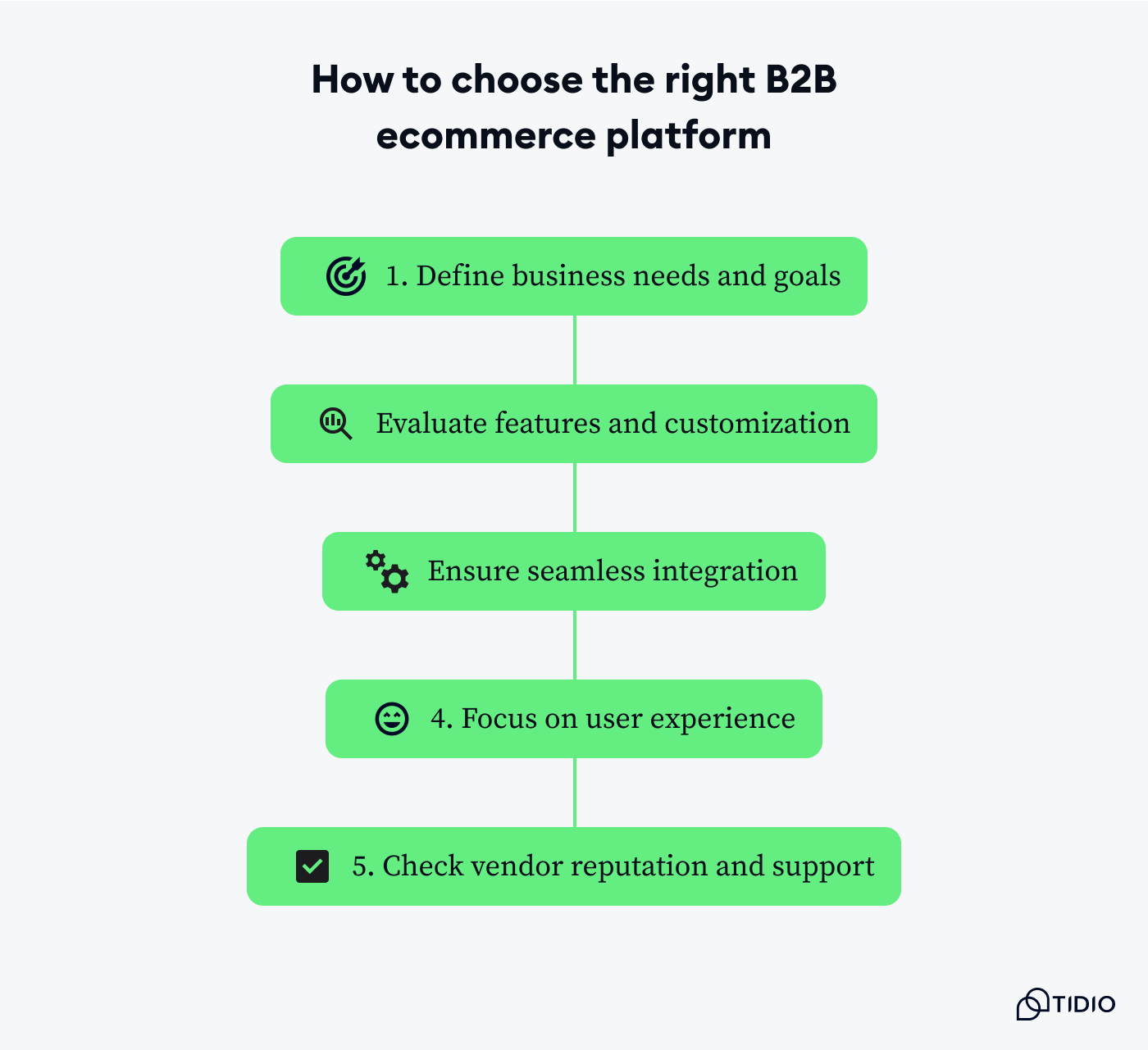
1. Define business needs and goals
Before exploring software options, get crystal clear on what your business needs. Consider factors like:
- Company size: A large enterprise with complex procurement cycles will have different needs than a smaller distributor.
- Industry requirements: Certain sectors require specialized features like bulk pricing tools, contract-based ordering, or regulatory compliance.
- B2B sales workflows: Whether it’s managing large purchase orders, recurring billing, or tiered pricing structures, the right platform should fit seamlessly into your existing sales process.
2. Evaluate features and customization
Not all B2B ecommerce companies look for the same feature. Nor are all B2B ecommerce solutions built the same. Flexibility is key. Prioritize platforms that offer:
- Flexible pricing models: Can you scale up or down without excessive costs?
- API integrations: A must-have for syncing with CRM, ERP, and accounting tools.
- Automation capabilities: Think automated invoicing, AI-driven recommendations, and smart reordering features that save time and reduce errors.
3. Ensure seamless integration
For midsize businesses, adopting new software shouldn’t feel like overhauling your entire system. Look for a solution that:
- Works with your current tools: Whether it’s Salesforce, QuickBooks, or a custom-built database, integration should be smooth and not require excessive manual work.
- Has easy implementation: A long and painful onboarding process could slow down operations and frustrate your team.
- Offers scalable solutions: If your business grows, can the software keep up without requiring a costly migration?
4. Focus on user experience
A great platform is both powerful and easy to use. Consider:
- Intuitive interfaces: Your team and customers shouldn’t need extensive training to navigate the system.
- Mobile accessibility: B2B buyers are increasingly making decisions on the go. A mobile-friendly interface is a must.
- Self-service functionalities: Clients appreciate the ability to track orders, manage invoices, and reorder without needing constant support.
5. Check vendor reputation and support
Even the best software will require support at some point. Make sure your vendor:
- Has a solid track record: Look for case studies and testimonials from businesses similar to yours.
- Offers responsive technical support: Whether it’s 24/7 assistance or a dedicated account manager, reliable support can make all the difference.
- Continuously updates, tests, and innovates: The right provider should be actively improving AI agents and the platform, ensuring it evolves alongside your business needs.
- Ongoing support and maintenance: Does the provider offer reliable support when issues arise? A strong service team will help operations run smoothly after launch.
Take the time to evaluate your needs carefully, and you’ll end up with a platform that fuels long-term growth rather than holding you back.
Automate your B2B ecommerce with AI
The ecommerce industry, especially its B2B ecosystems, is becoming heavily reliant on AI-driven tools. The reason is simple—these platforms can automate the majority of routine conversations, cutting customer service costs and improving sales.
If you’re a B2B ecommerce company looking to streamline your customer service cost-effectively while keeping the quality of your customer journey high, consider Tidio and its AI agent Lyro. It’s easy to implement, fast to deploy, and simple to train.
Try Lyro for yourself and get a feel for how it can make customer service easier.
Automate your B2B ecommerce service the right way with Tidio

